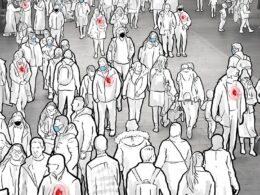health strategy institute (hsi)
& knowledge portal
for workforce health & economic prosperity
Joaquim Cardoso MSc.
Servant Leader, CRSO (Chief Research & Strategy Officer),
Editor in Chief and Senior Advisor
January 7, 2024
What is the message?
Obesity must be tackled as a national mission requiring concerted efforts from various sectors.
The article challenges the prevailing attitudes toward obesity, advocating for a shift from individual responsibility to recognizing it as a societal issue. The article emphasizes the potential for change, driven by scientific advancements, innovative programs, and successful interventions in schools and public institutions.
Addressing obesity is presented as crucial for improving public health, reducing healthcare costs, and enhancing overall societal well-being.
One page summary:
There is a urgent need for a concerted effort to combat obesity, framing it as a national priority.
It highlights the polarized scenario between the rich, who obsess over diet intricacies, and the poor, who are often stuck with cheap, heavily processed food.
The author contends that despite the prevailing challenges, the year 2024 could mark the beginning of a shift in addressing obesity.
Factors such as evolving scientific understanding of the impact of junk food, the financial strain on governments due to obesity-related costs, and successful initiatives in Europe and America contribute to this potential turnaround.
The article challenges the reluctance of politicians and healthcare professionals to influence dietary choices, emphasizing the addictive nature of certain food combinations and their neurological effects akin to addictive substances like nicotine and alcohol.
It suggests that mere public education is insufficient to reverse the obesity trend and cites the emergence of appetite suppressant drugs like Wegovy as a game-changer.
While cautious about their use, the author recognizes their potential to help individuals break free from the cycle of unhealthy eating.
Additionally, the article points out the changing approach of healthcare providers, with some clinics prescribing fresh food as medicine and innovative programs, like the “Fresh Food Farmacy” in Pennsylvania, aiming to improve access to healthy meals for diabetic patients.
The fatalistic attitude toward obesity is challenged, with the author stressing the need to address it as a societal issue rather than solely attributing it to genetics or personal choice.
Successful interventions in schools, such as the Chefs in Schools program promoting healthier eating habits among children, showcase the potential for wider implementation in public institutions.

Key Takeaways:
- Obesity is a pressing issue requiring urgent national attention due to its significant impact on health, productivity, and societal well-being.
- Scientific advancements, coupled with successful initiatives, offer hope for combatting obesity, including the introduction of appetite suppressant drugs like Wegovy.
- The addictive nature of some food compounds challenges the notion of personal choice in dietary decisions, necessitating broader interventions.
- Healthcare providers are adopting new approaches, prescribing fresh food and engaging in innovative programs to address obesity-related health issues.
- Successful interventions in schools and public institutions demonstrate the potential for broader societal changes in food habits and choices.
Examples and Statistics:
- Research indicates that certain food combinations trigger dopamine hits similar to addictive substances, contributing to overconsumption and obesity.
- Wegovy, an appetite suppressant drug, represents a significant development in combatting obesity, aiding individuals in breaking the cycle of unhealthy eating.
- Programs like the “Fresh Food Farmacy” in Pennsylvania have shown cost savings in healthcare by providing healthy meals to diabetic patients.
- One in three English children leaves primary school overweight, with significant disparities between socio-economic areas regarding obesity rates.
Conclusions and Recommendations:
While obesity has been treated fatalistically, recent advancements and successful interventions in various domains offer hope for addressing and potentially reversing the obesity crisis.
It suggests a need for broader action, including policy changes, educational initiatives, and greater involvement of public institutions in promoting healthier dietary choices.
The author emphasizes the societal impact of obesity on health, productivity, and economic prosperity and urges a collective effort to tackle this issue.
This is an Executive Summary of the article “Tackling obesity must become a national mission”, written by Camila Cavendish; and published on the Financial Times.












